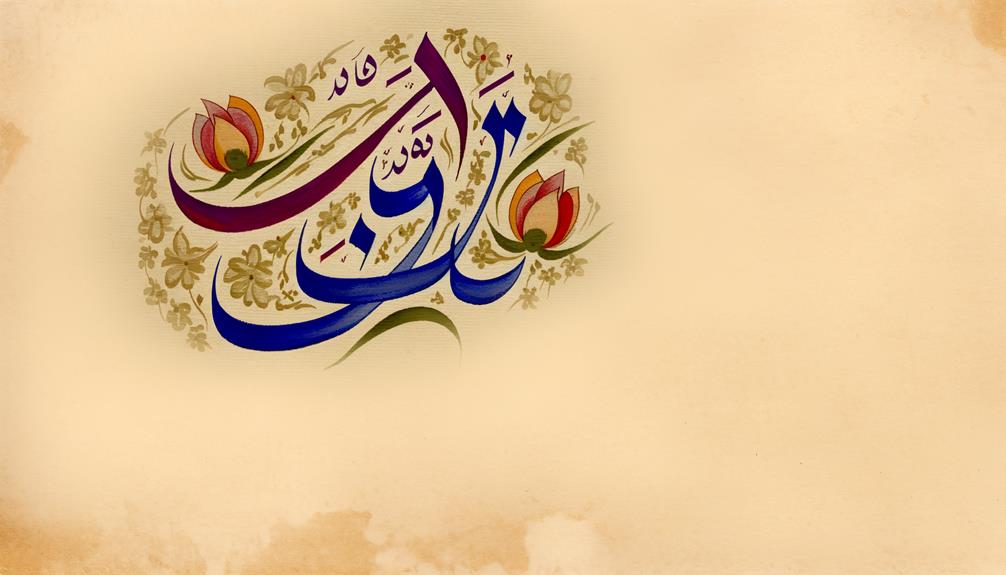Meaning of Name Ayat in Urdu
The name 'Ayat' in Urdu carries profound spiritual significance, originating from the Arabic word meaning 'sign' or 'miracle.' Referenced frequently in the Holy Quran, it symbolizes divine messages meant to guide and inspire believers. Using this name conveys a deep connection to faith and wisdom, intertwining seamlessly with Urdu culture and literature.
You'll find 'Ayat' woven into poetry and prose, offering moral and philosophical insights. By understanding the rich layers of this name, you explore an enduring legacy of beauty and spiritual depth that enriches daily life and cultural appreciation.
Continue your exploration for an even deeper understanding.

Key Takeaways
- The name Ayat in Urdu means 'sign' or 'miracle'.
- Ayat is derived from the Arabic language and used in the Holy Quran.
- It symbolizes divine messages and guidance for reflection and spiritual growth.
- In Urdu literature, Ayat often conveys moral lessons and philosophical insights.
- The name Ayat embodies beauty, perfection, and a deep connection with the Creator.
Etymology of Ayat
When exploring the etymology of 'Ayat,' you'll find that it originates from the Arabic language, where it holds profound religious and cultural significance. In Arabic, 'Ayat' means 'sign' or 'miracle' and is often used to refer to verses in the Holy Quran.
Each 'Ayat' serves as a divine sign, conveying messages and teachings. This term seamlessly integrates into Urdu, retaining its rich meaning and relevance.
Understanding the roots of 'Ayat' provides you with a deeper appreciation of its linguistic and cultural context. It's fascinating how a single word can carry such weight, bridging languages and traditions.
Spiritual Significance
When you consider the name Ayat, it's impossible to ignore its profound spiritual significance.
Each Ayat in the Quran carries divine messages that guide believers towards reflection and inner peace.
Embracing this name means embracing a legacy of wisdom and tranquility.
Divine Messages in Quran
Ayat in Urdu reflects the profound spiritual significance found in the divine messages of the Quran, serving as a guiding light for believers. Each Ayat, or verse, offers timeless wisdom and divine guidance, fostering a deep connection between you and the Creator.
- Guidance: They provide clear instructions on leading a righteous life.
- Hope: They instill hope and faith, especially in times of despair.
- Morality: They emphasize moral values and ethical behavior.
- Reflection: They encourage you to reflect on your purpose and existence.
Reflection and Inner Peace
Through the contemplation of Ayat, you find a profound sense of inner peace and spiritual clarity, enriching your soul and fostering a deeper connection with your faith. Reflecting on the divine verses offers you a pathway to serenity, guiding you through life's challenges with a calm and steadfast heart. Ayat serves as a reminder of the divine presence in your daily life, encouraging mindfulness and gratitude.
As you explore further into these sacred texts, you're likely to experience a transformative journey. This reflection not only brings tranquility but also strengthens your spiritual resolve. The name Ayat encapsulates this profound significance, urging you to seek wisdom and peace through constant reflection and understanding of Allah's words.
Ayat in Urdu Literature
In the rich tapestry of Urdu literature, the term 'Ayat' weaves through poetry and prose, embodying profound spiritual and cultural significance. You'll find that 'Ayat' is often used to evoke deep emotions and reflections.
Here are four ways 'Ayat' appears in Urdu literature:
- Poetry: Poets use 'Ayat' to symbolize divine messages and inspiration, enriching their verses with spiritual depth.
- Prose: Writers integrate 'Ayat' to highlight moral lessons and philosophical insights.
- Metaphors: 'Ayat' serves as a metaphor for beauty and perfection, drawing parallels to the divine creation.
- Narratives: Stories often include 'Ayat' to guide characters' journeys and moral decisions.
Understanding these contexts enhances your appreciation of Urdu literature's spiritual and cultural layers.
Cultural Relevance
You'll find the name Ayat deeply rooted in historical and cultural contexts within Urdu-speaking communities. It holds significant religious importance, often appearing in Quranic verses, and has been celebrated in Urdu literature for its profound meanings.
Understanding its cultural relevance sheds light on how the name resonates through generations, symbolizing both spiritual and literary heritage.
Historical Significance in Urdu
Rooted deeply in Urdu literature and Islamic tradition, the name Ayat carries a profound historical significance that resonates through centuries of cultural and religious narratives.
When you explore its rich heritage, you'll discover:
- Historical Texts: Ayat frequently appears in classical Urdu poetry, symbolizing divine signs and wisdom.
- Cultural Heroes: Many figures in South Asian history have embraced the name, reflecting its esteemed status.
- Linguistic Influence: The term has enriched Urdu language, blending seamlessly into everyday conversations and literary works.
- Artistic Expressions: Ayat has inspired countless artists and calligraphers, who depict its beauty in their works.
Understanding Ayat's historical significance enhances your appreciation for its enduring presence in Urdu culture and beyond.
Religious and Literary Context
Ayat's significance in both religious texts and literary works highlights its deep cultural relevance in Urdu-speaking communities. In the Quran, an Ayat refers to a verse, each one seen as a sign from God, carrying profound spiritual meanings. This makes the name Ayat not just a word but a symbol of divine communication and wisdom.
In Urdu literature, Ayat often appears in poetry and prose, enriching the language with layers of meaning. When you name someone Ayat, you’re acknowledging a rich heritage of religious devotion and literary beauty. It’s a name that resonates deeply, embodying the essence of spiritual and cultural identity. Moreover, names hold significant weight in Urdu culture, often reflecting profound meanings and connections to history. For instance, the meaning of aqsa in Urdu can evoke feelings of aspiration and reverence, as it is associated with the sacred Al-Aqsa Mosque, symbolizing peace and unity. Thus, choosing names like Ayat or Aqsa enriches one’s identity and underlines a commitment to cultural and spiritual values.
Understanding this context helps you appreciate the name's profound significance in everyday life.
Ayat in Daily Life
In your daily life, the name Ayat can serve as a constant reminder of the profound messages and wisdom embedded in the Quran. This beautiful name can influence your actions and thoughts in many ways:
- Reflection: It encourages you to reflect on the deeper meanings of Quranic verses.
- Guidance: Ayat can inspire you to seek guidance from the Quran in times of uncertainty.
- Resilience: It reminds you to remain resilient and steadfast in your faith.
- Gratitude: The name Ayat can help you cultivate a sense of gratitude for the divine signs in your life.
Embracing the essence of Ayat in your daily routine can lead to a more meaningful and spiritually enriched existence.
Naming Trends
You'll notice that contemporary naming trends often reflect a fusion of cultural heritage and current influences. Today, parents seek names that pay tribute to their cultural origins while resonating with contemporary sensibilities.
In Urdu-speaking communities, there's a growing admiration for names like Ayat, which carry profound meanings and aesthetic appeal. Ayat, signifying 'verse' or 'symbol' from the Quran, exemplifies this trend. It's spiritually significant and has a melodious quality that fits well in today's globalized world.
When selecting names, you're likely attracted to those with historical depth and modern relevance, connecting the past and present. This harmony guarantees the name remains timeless, meaningful, and distinctive, making it an ideal choice for new generations.
Conclusion
In your journey to understand the name Ayat, think of it as a precious gem. It's filled with deep spiritual significance, rich Urdu literary references, and cultural relevance.
Ayat isn't just a name; it's a reflection of divine signs and everyday beauty. As you consider naming trends, remember that choosing Ayat is like selecting a timeless piece of art, resonating with history and modernity alike.
Your choice will surely shine bright in any cultural setting.






